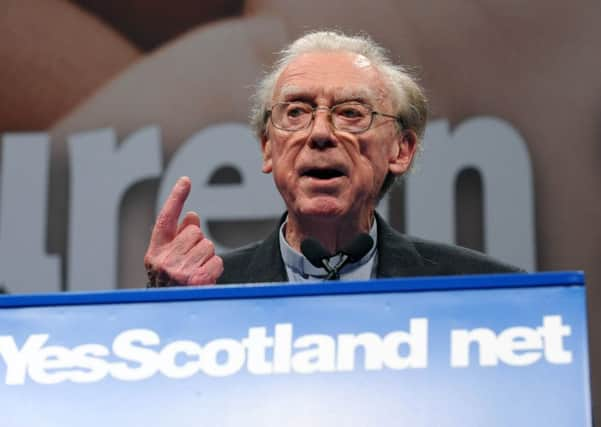Obituary: Canon Kenyon Wright, campaigner for Scottish devolution


Travelling to India to become a Methodist missionary with his wife, Betty, in the early 1950s, it’s unlikely the young Kenyon Wright would have had the faintest notion of what an enormous impact he would one day have on the Scottish devolution movement. The part he played in paving the way for the creation of a Scottish Parliament cut through party political and religious divides, and following his recent death at the age of 84, Scotland’s First Minister Nicola Sturgeon declared that his legacy would live on through that parliament’s work.
Kenyon Edward Wright was born in 1932 in Paisley, where his father was a technician for J&P Coats, now called Coats, a key employer in the textile industry. A bright boy with an inquiring mind and a strong sense of social justice, he studied at Paisley Grammar and the University of Glasgow, where he graduated in maths and philosophy. He then moved down south to Cambridge University to begin an MA in theology.
Advertisement
Hide AdAdvertisement
Hide AdInspired by his faith, he accepted a missionary post and, in his early twenties, headed for India with his wife. Based in the new industrial city of Durgapur, west Bengal, he founded and was director of the Ecumenical, Social and Industrial Institute, a national training centre for urban industrial ministries for the churches of India. Not the sort of man to expect everyone to speak his language, he learnt Bengali (in addition to being able to speak French and German).
The family – which now included three daughters – returned to the UK in 1970 and Wright was appointed director of urban ministry at Coventry Cathedral, where he gained valuable experience of finding common ground among parties with conflicting goals.
This stood him in good stead for the job he would take when he went back to Scotland just over a decade later – general secretary of the Scottish Council of Churches (now named Action of Churches Together in Scotland). After 11 years in that post, he took on his next challenge, which was the culmination of almost everything dear to his heart.
Having long campaigned for Scottish devolution, for many he was the natural choice in 1989 as chairman of the executive committee of the Scottish Constitutional Convention, which laid the groundwork for the dramatic changes that were to take place over the coming decades.
Following on from the 1979 referendum, which had delivered a No vote for devolution, Wright’s role at the convention included trying to find a consensus among a broad selection of disparate groups, including trade unions and political parties – including the Scottish National Party, which had initially boycotted the convention – as well as church groups and business interests, while setting out the key demands for a Scottish parliament, or assembly, with law-making powers.
To many the job seemed impossible. The then Conservative Secretary of State for Scotland, Malcolm Rifkind, went as far as saying that if the parties involved reached a consensus he would jump off the roof of the Scottish Office.
And yet Canon Wright succeeded, with Rifkind no doubt later claiming that he had been speaking figuratively.And when Margaret Thatcher, prime minister at the time, dismissed the possibility of Scottish devolution, Wright responded by saying: “We say yes, and we are the people.”
Thanks largely to the convention’s work, Labour’s 1997 election manifesto included the policy for devolution, and on 11 September that year 44.87 per cent of Scottish voters agreed in a fresh referendum that there should be a Scottish parliament. Two years later the first meeting of the Scottish Parliament took place, with Donald Dewar elected as the first First Minister.
Advertisement
Hide AdAdvertisement
Hide AdFollowing Canon Kenyon Wright’s death, Ms Sturgeon said that his input into the creation of the parliament could not be understated. “His chairmanship of the Scottish Constitutional Convention… was testament to his strength of character, tenacity and charisma. He was able to bring together the different strands of Scottish politics and society to achieve consensus about the way ahead for Scottish devolution.”
Her predecessor Alex Salmond, now the SNP’s foreign affairs spokesman, said: “His role in the Scottish Constitutional Convention showed a patience, commitment and determination of extraordinary dimensions.”
In 1999 he was made a CBE for services to Scottish devolution and constitutional reform, and the following year was given an honorary D.Litt from Queen Margaret University. Always a man who wanted to make a difference, he ran twice for office with the Liberal Democrats – first for the Banff and Buchan Westminster seat in 2001 and then in Stirling for Holyrood in 2003 – but was defeated on both occasions.
After retiring as a priest in 2008 he went to live in the Midlands, but remained incredibly active politically. He was a consultant on ecology, social ethics and constitutional change; a consultant to Action of Churches Together in Scotland; a fellow of the Scottish Council for Development and Industry and Canon Emeritus of Coventry Cathedral. He also became a proponent of English devolution.
Canon Kenyon Wright died at home in Stratford-upon-Avon, and is survived by wife Betty and three daughters, Lindsey, Shona and Shelagh.